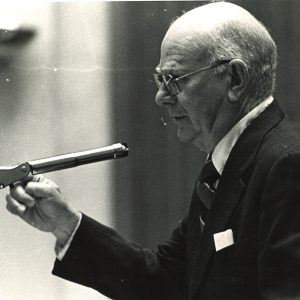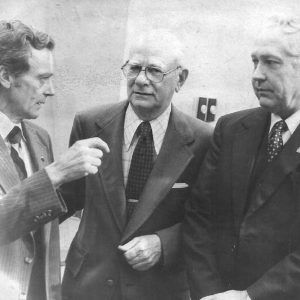calsfoundation@cals.org
Robert Drennen (Bob) Harvey (1914–2001)
Robert Drennen (Bob) Harvey was a farmer and lawyer in Jackson County who spent thirty-two years in the Arkansas General Assembly after World War II, most notably fighting relentlessly for a lean state government. He announced to his colleagues in 1978 that he was not going to run for the Arkansas Senate again because he had finally recognized the loneliness and futility of trying to maintain frugal government in Arkansas. Harvey, a soft-spoken bachelor, was an icon in Jackson County, his forebears having arrived there in 1849.
Bob Harvey was born on May 22, 1914. His father and mother, William Richard Harvey and Lula Belle Shaver Harvey of nearby Strawberry (Lawrence County), were farmers near the town of Swifton (Jackson County), and he eventually took over and enlarged the farming operations. He was a star on the Swifton high school basketball team, attended a military preparatory school in Tennessee, and then went to Vanderbilt University at Nashville, Tennessee, where he received a BA in 1937 and a law degree in 1939. He was on the track team at Vanderbilt and remained a booster of the university for the rest of his life. Harvey set up a permanent scholarship at the school, but preference was always to be given to any applicant from Jackson County. He enlisted in the U.S. Army in 1942 and was in the service for the duration of the World War II.
Like many Arkansas veterans of the war, Harvey entered politics in 1946. He was elected state representative from Jackson County, reelected four times, and then in 1956 was elected to the state Senate. He rarely had an opponent. He soon got on the Arkansas Legislative Council, a legislative committee that met monthly between legislative sessions, and also the Joint Budget Committee, originally a small group of lawmakers from both houses who did all the work on budgets and appropriations every two years and drafted the vital Revenue Stabilization Act, which distributed state tax funds among all agencies of government. He was chairman of the Joint Budget Committee his final twelve years in the Senate.
Harvey rarely missed a minute of the meetings; he pored over the massive budget documents and grilled agency heads about the purposes of and need for expenditures. His colleagues often found him tedious but sometimes went along with the cuts that he proposed. When he argued for holding down the then-meager pay and expenses that legislators collected for attending legislative sessions and interim committee meetings, he was called “Sawbuck Harvey.”
Although Harvey always complained about government overspending, he did not uniformly oppose tax increases. In 1971, when new governor Dale Bumpers proposed a graduated income tax and other progressive taxes to increase support for the public schools and to develop new parks around the state, Harvey gave him vital votes for taxes. He also supported more money for the state’s underfinanced public schools; he despaired in 1977 that he needed to quit the legislature because he had consistently failed to get fair funding for the schools in his farming districts when the legislature, at nearly every session, fought over a new formula for distributing state aid among some 400 school districts. Public school aid at that time accounted for nearly half the state budget.
Although he never publicly battled his colleagues on what could be considered ethical issues, he was scrupulous himself. Before 1970, the act of amending and voting on bills in committees was done behind closed doors in the Senate. When a senator in the Budget Committee’s closed meeting inserted baffling language deep in the appropriation bill for the Arkansas State Police in 1969—language that barred troopers from raiding gambling venues in Hot Springs (Garland County), as they had done under Governor Winthrop Rockefeller—Harvey quietly tipped off a reporter for the Arkansas Gazette and a quiet senator from Lonoke (Lonoke County). When he was presenting budget bills to the Senate for final votes that day, Harvey was asked if he could explain a bewildering sentence far into the appropriation. Harvey turned to the page, read it aloud slowly, scratched his head, and shrugged. The Senate quickly amended the sentence out of the bill, and the gambling operations remained closed.
Harvey was a champion of public libraries and preserving Arkansas history and genealogy, through the Arkansas History Commission (now the Arkansas State Archives) and the state’s libraries.
Harvey died on May 19, 2001, and is buried in Swifton Cemetery.
For additional information:
“Deaths: Swifton—Mr. Robert ‘Bob’ Harvey.” Arkansas Democrat-Gazette, May 20, 2001, p. 9B.
“Robert Harvey: Former Legislator Known for Frugality.” Arkansas-Democrat Gazette, May 20, 2001, p. 8B.
Ernest Dumas
Little Rock, Arkansas
 Politics and Government
Politics and Government World War II through the Faubus Era, 1941 through 1967
World War II through the Faubus Era, 1941 through 1967 Robert Harvey
Robert Harvey  Knox Nelson and Colleagues
Knox Nelson and Colleagues 



Comments
No comments on this entry yet.